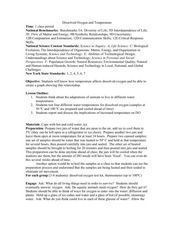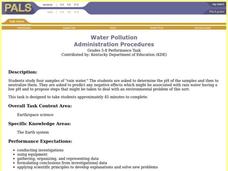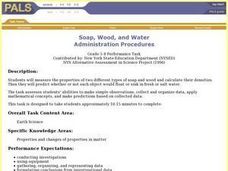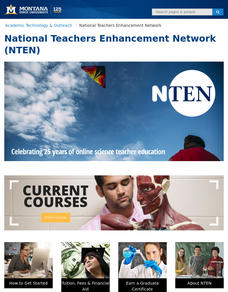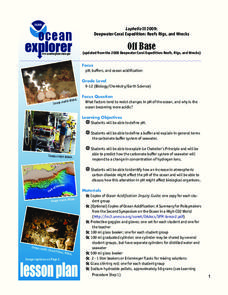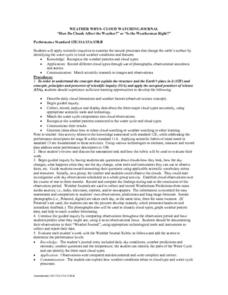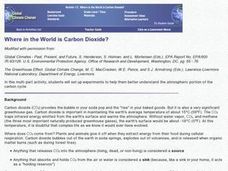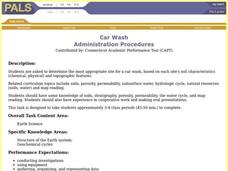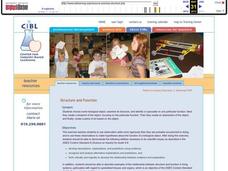Curated OER
Dissolved Oxygen and Temperature
Students are shown how temperature affects dissolved oxygen and they create a graph showing this relationship. They think about the adaptations of animals to live in different water temperatures. Students test four different water...
Curated OER
Water Pollution
Young scholars study four samples of "rain water". They asked to determine the pH of the samples and then to neutralize them. Students are asked to predict any negative effects which might be associated with water having a low pH and...
Curated OER
Documenting Science Through an Active Inquiry Process
Pupils follow procedures regarding scientific data collection. In this scientific inquiry lesson, students investigate inquiry questions through research and data collection. Pupils use technology tools to create products that feature...
Pennsylvania Department of Education
Wind and Water Wheels
Students identify wind and water as natural resources that create energy. In this natural resources and energy use lesson, students work in groups to construct a pinwheel, then explore the effects of wind and water on the pinwheel....
Curated OER
Boston Harbor Cruise: A Shoreline Survey
The students take a harbor cruise, photograph, and draw shore line features attending to evidence of human impact/consequences, and its cost on marine/land animal habitats vegetation, weather patterns, signs of erosion, and the water...
Curated OER
What's The Matter: A Sinker or Floater?
Students conduct an experiment. In this water lesson, students watch the lesson "Float and Sink" on an interactive website. Students learn how to test items in water and then work in groups to test their items. Students discuss their...
Curated OER
Reflection and Absorption of Light
Students use a microcomputer connected to a light sensor and temperature probe to explore the reflection and absorption of radiation for different surfaces. Students follow instructions in this guided inquiry based lab and are then asked...
Curated OER
Soap, Wood, and Water
Students measure the properties of two different types of soap and wood and calculate their densities. Then they predict whether or not whether or not each object would float or sink in fresh or salt water.
Curated OER
Water Density Boundaries
Young scholars create observable layers in water that represent a separation based upon density differences. They model density boundaries using differences in temperature and salinity. They, in groups, perform a meaningful experiment...
Curated OER
Do Human Practices Affect Water Quality?
Students determine if human practices have any noticeable effects on the quality of stream life as measured by the presence of certain macroinvertebrates. They collect, preserve and identify macroinvertibrate samples and quantify the data.
Curated OER
Science: Floating and Sinking Objects
Second graders discuss why some objects float while others sink. They examine various objects and predict whether or not they will sink or float. Students discover the properties needed for objects to float.
Curated OER
Off Base
Young scholars explain the Chatelier's Principle. In this pH lesson, students identify factors that resist changes in pH of the ocean and why the ocean is becoming more acidic.
Curated OER
Science- Unit on Matter- Solids
Second graders identify and describe properties of matter.
They identify three forms of matter- solids, liquids, and gases with 100% accuracy. The student describes the properties of solid objects.
NOAA
Seafood and Human Health
Whether your young biologists realize it or not, humans play a significant role in marine ecosystems. To help them understand this fact children first create graphical representations that show homo sapiens' place in marine food chains,...
Curated OER
Investigate Pine Creek!
Students are invited to become detectives in this Web-Integrated Science Environment (WISE) as they explore a local creek, its environment and ongoing status. Students participate in field trips, acquisition of data through water testing...
Curated OER
Will It Sink Or Float?
Have your class predict whether objects will sink or float in water. Learners consider a data table of mass, volume and whether the object sank or floated. They develop an evidence-based explanation for the results.
Curated OER
Sometimes, solid + liquid = gas
Third graders experiment with common household liquids and solids. In this chemical reaction lesson, 3rd graders discuss phase changes and experiment to find other ways to create gases. They use water, vinegar, lemon juice, flour, baking...
Curated OER
Discovering Chemical Changes
Fourth graders predict what happens in a teacher demonstration of a chemical change, before watching it. They observe the demonstration and list what the see on the board before determining which represent chemical change. Working at...
Curated OER
Weather Whys- Cloud Watching Journal
Students examine how natural processes change the earth by identifying their local water cycle. Individual students complete a cloud journal over a specific period of time. They observe clouds daily and take photographs of the clouds...
Curated OER
Introduction to the Scientific Method
Students recognize and follow the steps of the scientific method to complete an experiment. In this scientific method activity, students use inquiry tools to measure objects. Students record their data.
Curated OER
Where in the World is Carbon Dixoide?
Students conduct experiments designed to detect the presence of CO2 by using a BTB that changes color (blue to yellow) in the presence of CO2. First, students experiment with the CO2 from combining vinegar and baking soda. In part two,...
Curated OER
Car Wash
High schoolers determine the most appropriate site for a car wash, based on each site's soil characteristics (chemical, physical) and topographic features. They perform an experiment to determine the changes to three different soil types...
Curated OER
Structure and Function
Structure and Function
SynopsisStudents choose some biological object, examine its structure, and identify or speculate on one particular function. Next they create a blueprint of the object, focusing on the particular function. Then...
Curated OER
Hot Cans and Cold Cans
Young scholars investigate the physics of heating and cooling through conduction, convection, and radiation. Working in groups, they determine the best way to cool a can of water and warm a can of water. Temperature is taken at five...


